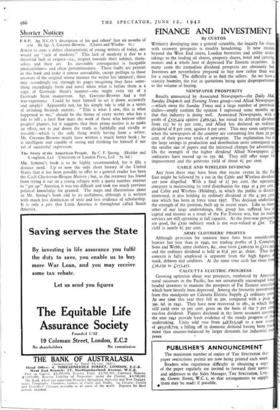FINANCE AND INVESTMENT
By CUSTOS
WITHOUT developing into a general scramble, the inquiry for shares with recovery prospects is steadily broadening. It now extends beyond the West End stores, London breweries and utility under- takings to the leading oil shares, property shares, hotel and catering, motors and a whole host of depressed Far Eastern securities. In many cases the immediate dividend prospects are obviously bad. Investors are nevertheless prepared to buy now rather than wait for a reaction. The difficulty is to find the sellers. So we have a scarcity boomlet, the rise in quotations being quite disproportionate to the volume of buying.
NEWSPAPER PROSPERITY Results announced by Associated Newspapers—the Daily ma, Sunday Dispatch and Evening News group—and Allied Newspapers —which owns the Sunday Times and a large number of provincial dailies—amply confirm the opinion I expressed some months ago that this industry is doing well. Associated Newspapers, with a profit of £535,424 against £469,542, has raised its deferred dividend from 124 to 15 per cent., and Allied has declared an ordinary dividend of 8 per cent. against 6 per cent. This may seem surprising when the newspapers of the country are consuming less than 20 per cent. of their pre-war totals of newsprint. The explanation lies in the large savings in production and distribution costs consequent on the smaller size of papers and the increased charges for advertising. On the strength of the higher dividend Allied Newspapers £1 ordinaries have moved up to 25s. 6d. They still offer scope for improvement and the generous yield of about 64 per cent.
CABLE AND WIRELESS DIVIDEND
Any fears there may have been that recent events in the Fa East might be followed by a cut in the Cable and Wireless dividend are now dispelled. With a final of 24 per cent. the operating company is maintaining its total distribution for 1941 at 4 per cent and Cable and Wireless (Holding), in which the public is directly interested, is also holding its ordinary dividend at the 4 per cent rate which has been in force since 1937. This decision underline the strength of the position, built up in recent years. Like so man other of our large undertakings, this group has suffered loss capital and income as a result of the Far Eastern war, but its main' services are still operating at full capacity. As the post-war prospect are good, the £ioo ordinary stock is not over-valued at Or. Th• yield is nearly 64 per cent.
ARMY CLOTHIERS' PROFITS
Although provision for taxation must have been considerabl heavier last year than in 1940, net trading profits of J. Compt' Sons and Webb, army clothiers, &c., rose from £106.030 to £111,34 and the ordinary dividend is held at 82cl. per 4s. share. That thi concern is fully employed is apparent from the high figures stock, debtors and creditors. At the same time cash has risen f £56,239 to £153,452.
CALCUTTA ELECTRIC PROGRESS
Growing optimism about war prospects, reinforced by Amen naval successes in the Pacific, has not unnaturally encouraged long headed investors to examine the prospects of Far Eastern securiti which have latterly been depressed. Among the favourite investmen from this standpoint are Calcutta Electric Supply Li ordinary um At one time this year they fell to zos. compared with a peak 39s. 6d. in 1941. They have now recovered to 28s., at which the still yield over ro per cent. gross on the basis of the j per cep tax-free dividend. Figures disclosed in the latest accounts covenn the year 1941 provide fresh evidence of the steady progress of th undertaking. Units sold rose from 448,853,348 to a new recd of 493,038,719, a falling off in domestic demand having been mu more than counter-balanced by larger demands for industrial P poses.


























 Previous page
Previous page